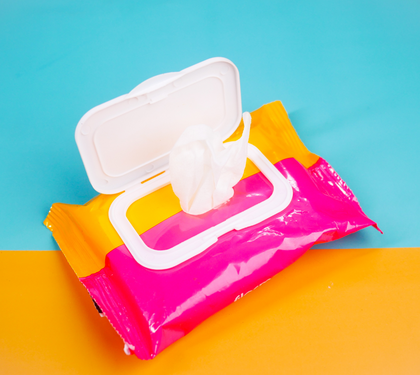Moving to university is an exciting milestone—new experiences, new friends, and the start of your independent life. But with all the excitement, it’s easy to overlook the environmental impact of the items you bring with you. From single-use plastics to unnecessary packaging, the choices we make when moving can have a lasting effect on the planet. But don’t worry, living sustainably while you’re at university is easier than you might think. In this blog post, we’ll explore some sustainable alternatives to common items on your packing list, helping you reduce your environmental footprint right from the start.
1. Reusable Makeup Wipes: A Greener Beauty Routine
Traditional makeup wipes are convenient but come with a heavy environmental cost. Most are made from non-biodegradable materials and are used only once before being thrown away. The result? Billions of wipes end up in landfills each year, where they take hundreds of years to break down.
The Sustainable Swap: Reusable makeup wipes. These eco-friendly alternatives are made from materials like organic cotton or bamboo and can be washed and reused hundreds of times. Not only do they reduce waste, but they’re also gentler on your skin. To use, simply apply your makeup remover or cleanser to the reusable pad, wipe your face, and then toss the pad in the wash. A small investment upfront will save you money in the long run and help keep your beauty routine green. Invest in a pack of 20 Green Face Co reusable make up wipes. Each wipe goes through the washing machine 500 times, so they'll be sure to last you a long time.
2. Toilet Paper Spray: Ditch the Wet Wipes
Wet wipes are often marketed as a more hygienic alternative to toilet paper, but they’re far from eco-friendly. Most wet wipes contain plastic fibres, making them non-biodegradable. Even those labeled "flushable" can cause blockages in sewer systems and contribute to water pollution.
The Sustainable Swap: FreshX Toilet paper spray. This ingenious alternative allows you to keep the convenience of wet wipes without the environmental guilt. Simply spray a little on your regular toilet paper, and you’ll have the same cleansing effect as a wet wipe—minus the waste. FreshX Toilet Tissue Spritz made from natural ingredients and the bottles are made from recycled making them a sustainable addition to your bathroom routine.
3. Bamboo Toothbrushes: A Better Brushing Option
Plastic toothbrushes are another everyday item that contributes to environmental waste. It’s estimated that over 1 billion plastic toothbrushes are thrown away each year in the United States alone, each taking hundreds of years to decompose.
The Sustainable Swap: Bamboo toothbrushes. Bamboo is a fast-growing, renewable resource that biodegrades much more quickly than plastic. Many bamboo toothbrushes also come in recyclable or compostable packaging, further reducing their environmental impact. Plus, they’re just as effective at keeping your teeth clean as their plastic counterparts.
4. Reusable Water Bottles: Hydration without the Waste
Single-use plastic water bottles are one of the biggest sources of pollution worldwide. Not only do they contribute to landfill waste, but the production of plastic bottles also requires significant amounts of fossil fuels and water.
The Sustainable Swap: A reusable water bottle. Whether it’s stainless steel, glass, or BPA-free plastic, investing in a good quality reusable water bottle will keep you hydrated and help reduce plastic waste. Many universities have water refill stations, making it easy to keep your bottle full throughout the day.
5. Eco-Friendly Notebooks: Write with a Conscience
Notebooks are an essential part of any student’s toolkit, but traditional paper production is resource-intensive and often involves harmful chemicals.
The Sustainable Swap: Eco-friendly notebooks. Look for notebooks made from recycled paper or sustainably sourced materials. Some brands even offer tree-free options, using materials like stone paper or agricultural waste. These notebooks are just as functional as traditional ones but come with the added benefit of reducing deforestation and pollution.
6. Second-Hand Furniture: Furnish Sustainably
Furnishing your university accommodation can be expensive and resource-heavy if you opt for brand new items. New furniture often comes with a lot of packaging and has a higher carbon footprint due to manufacturing and transportation.
The Sustainable Swap: Second-hand furniture. Check out local thrift stores, online marketplaces, or university buy-and-sell groups for gently used furniture. Not only is this option more affordable, but it also gives items a second life and reduces the demand for new production. You can even find some unique and stylish pieces that add character to your space.
7. Cloth Shopping Bags: Sustainable Grocery Runs
As a student, you’ll likely be making regular trips to the grocery store, and it’s important to avoid the convenience of plastic bags.
The Sustainable Swap: Cloth shopping bags. These reusable bags are sturdier than plastic, can carry more items, and are available in a variety of designs. Keep a few in your backpack or by the door so you’re always prepared for a grocery run. Some stores even offer discounts for using your own bags!
Starting university is the perfect time to embrace sustainable habits that will benefit both you and the environment. By making mindful choices when packing and shopping for your new life on campus, you can reduce your carbon footprint and set a positive example for others. Sustainable living doesn’t mean sacrificing convenience or comfort—it’s about making small changes that collectively have a big impact. So, as you prepare for this exciting new chapter, remember that every little bit helps, and you have the power to make a difference.
Happy packing, and here’s to a greener, more sustainable university experience!



